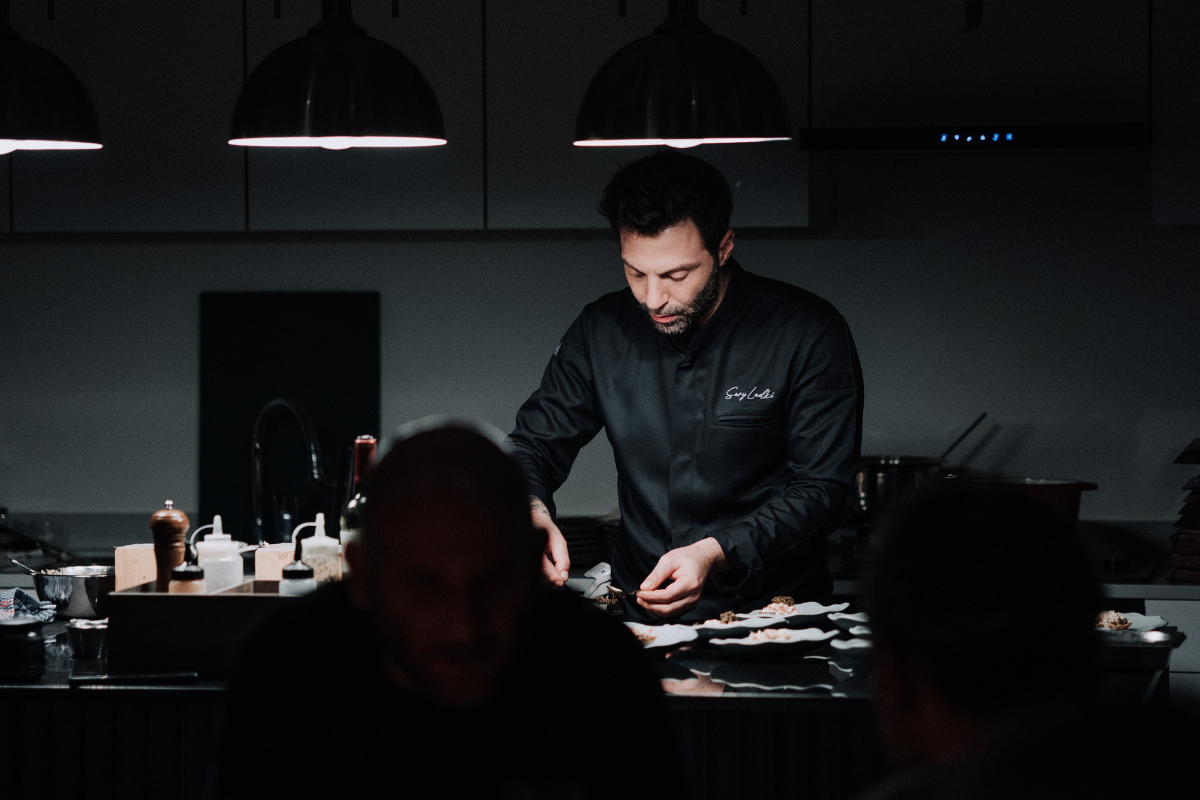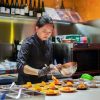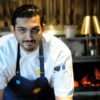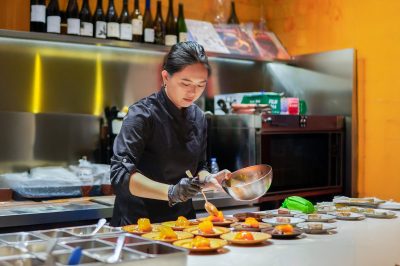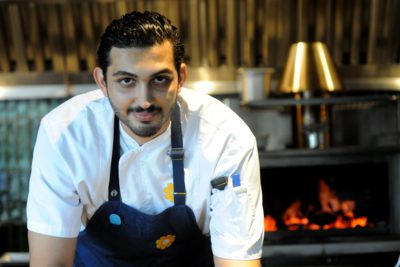Beirut, a vibrant and multicultural city, has recently become home to a singular gastronomic project: Cena by Sary. After years of experience in kitchens across Canada and training at the Culinary Institute of Barcelona (CIB), chef Sary Ladki found in the Lebanese capital the perfect stage to unite two culinary worlds: Spanish tradition and Mediterranean hospitality.
Opening one’s home to share a meal with friends and family is a hallmark of both Spanish and Lebanese cultures, and Sary has turned that gesture into his daily life. Several times a week, the living room of his loft becomes the epicenter of an intimate and heartfelt dining experience.
In this interview, we discover how Cena by Sary was born, what it truly means to work as a private chef, the role CIB played in his professional development, and why Sary believes that passion, discipline, and dedication are the pillars of becoming a chef.
Spanish cuisine on the other side of the Mediterranean
Lebanon and Spain share more than one might think, and food is certainly one of those bridges. Both cuisines embrace the concept of tapas, seasonal produce, small dishes meant to be shared, and long, convivial conversations after a meal. Yet in Beirut, until recently, finding authentic Spanish cuisine was nearly impossible.
That was what inspired Sary Ladki to launch Cena by Sary, a private dining experience for groups of six to twelve guests in his hometown. His proposal goes far beyond a simple six-course tasting menu: every dish is infused with memories, technique, and a deep love for Spanish gastronomy and its ingredients. Though the menu changes every two months, seafood remains the star of his kitchen, paella has become his signature dish, and molecular gastronomy serves as his creative tool. At Cena by Sary, guests don’t just eat, they learn. They watch Sary in action, cooking just in front of them, discovering the secrets behind each dish.
I’ve somehow become a bridge between Lebanon and Spain, connecting these two culinary worlds! I want people to understand Spanish food. I really enjoy diners who are proactive, who want to learn about the cuisine. I love teaching them to respect the product.
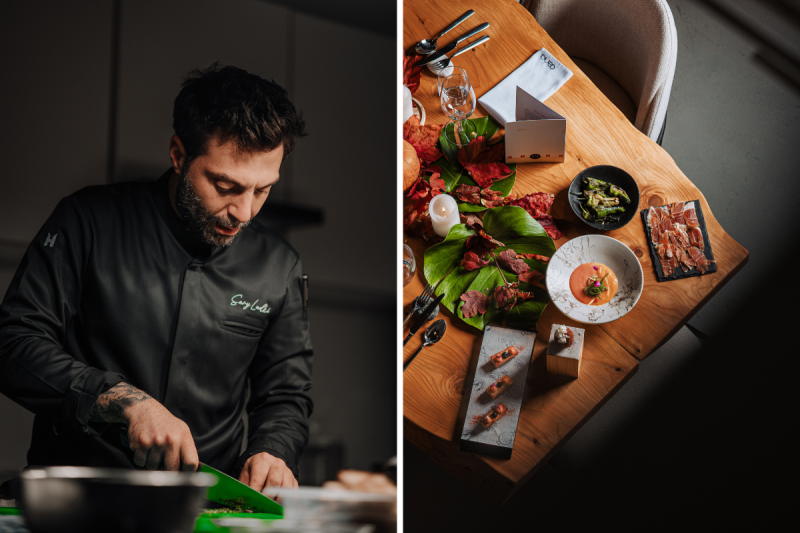
Meticulous and highly organized, Sary gives the same importance to the seasonal flowers on the table as to the food itself. His passion and respect for his craft shine through not only in his interaction with guests but also in the discipline and time he dedicates to his work, essential qualities for any private chef or kitchen leader. Although Sary had carried this passion within him since childhood, the road was not an easy one.
He had spent countless hours in the kitchen growing up, playing at running a restaurant with his mother and grandmother. Later, he began experimenting with flavors and creating dishes of his own, without really knowing why. Though he always felt drawn to cooking, he initially pursued marketing and worked in the family business, even balancing it with restaurant work. But his love for the kitchen eventually pushed him to take the leap and devote himself entirely to being a chef.
In Canada, Sary gained extensive knowledge of international cuisine. When he later moved to Barcelona to study, his friends assumed he would only learn Spanish cooking, and back home people began to associate him with our gastronomy; an assumption that would later inspire Cena by Sary. That “misunderstanding” became the seed of something promising.
After years of success in professional cuisines and his education in Barcelona, Sary felt it was time to go solo and to cook privately for small groups, managing every step himself (from cleaning and mise en place to service and shopping). In this format, he discovered a new kind of freedom a restaurant could never offer, sharing his love for Spanish cuisine directly with his guests. It was something he had never anticipated, yet it led him to unforgettable experiences, such as preparing a dinner for the Spanish ambassador to Lebanon and his team.
Every time I go to Spain, I bring back fifteen kilos of bomba rice, Jerez vinegar, ñora paste, carabineros. I want my guests to taste real Spanish food. I want them to learn to appreciate the socarrat, for example.
Sary’s cooking, rooted in a deep respect for the unique ingredients of Mediterranean cuisine and the need to treat them with care, can perhaps be best understood through this reflection he shared during the interview on the chef’s role:
Nature is wonderful and very intelligent. In fact, we’re only cooks, nature does most of the work in creating a dish. We just have to listen and transform it only as truly necessary.
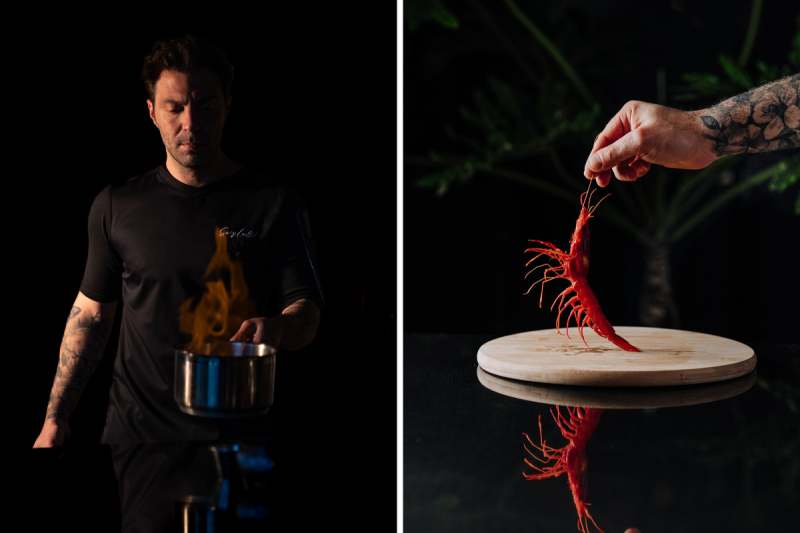
Working as a private chef: the challenge of finding freedom
Though Sary still defines himself above all as a chef, his professional life changed completely when he left the frenetic rhythm of restaurants behind. He has always loved the energy and pressure of service, but after years working in diverse cuisines and cultures, he values more than ever the creative freedom that comes with being a private chef.
He acknowledges that the shift came with risks, but also with rewards: the chance to create something of his own, take full control of every process, and share his passion for food in a more personal way.
If there’s one thing I’ve learned, it’s that you have to take risks to grow.
He believes that working in restaurants is a crucial stage before going independent. The seven years he spent in professional kitchens were essential to developing the organization and discipline that now defines his work. He insists that no cook should skip that stage, believing that competition should be viewed as an opportunity for learning and creative growth, something to be embraced with a positive spirit.
With time, he has also understood the importance of emotional balance in the kitchen. Sary believes a chef’s mood is reflected in their dishes, and that many cooks, overwhelmed by pressure, lose sight of the joy that brought them to cooking in the first place. For him, true success only comes when you genuinely love what you do.
Cena by Sary: a personal project with a Spanish soul
Sary’s search for freedom and authenticity materialized in Cena by Sary, a private dining concept that blends fine-dining technique with the warmth of a home gathering. The project didn’t happen overnight, it followed several failures and moments of doubt. Yet his belief in himself and his idea kept him going. Today, this space embodies his purest way of cooking: no bosses, no imposed rules, and the chance to share his culinary vision directly with each guest.
Every element, from the name and visual identity to photography, was carefully chosen to reflect the mood he wants to convey through his food.
His internship at Xavier Pellicer was a turning point. During his training at CIB, Sary completed a three-month internship at Xavier Pellicer’s restaurant as part of his professional program. Working in an open kitchen for the first time allowed him to see diners’ reactions and interact directly with them; an experience that became the emotional foundation of Cena by Sary.
As a private chef, Sary manages everything: mise en place, shopping, cooking, cleaning, and coordinating service, with one waiter assisting during dinner. It’s physically demanding work that requires immense time management, yet for him, the level of dedication and organization is the same as running a restaurant kitchen.
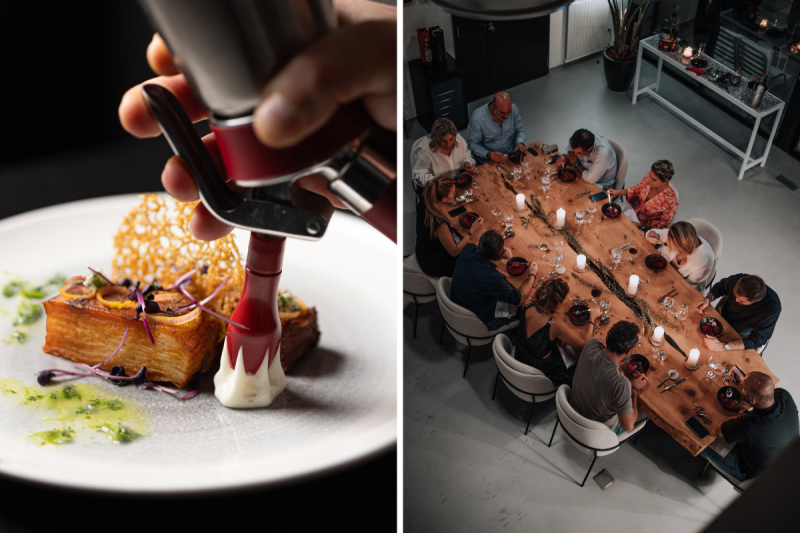
The relationship with guests: a learning and emotional experience
Sary’s total involvement also creates a unique bond with his dinners. For him, cooking is not just about preparing food, it’s about educating and connecting. Teaching Lebanese guests about Spanish cuisine has become one of the greatest challenges and one of the most rewarding parts of his work.
He sees his role as something more than cooking: it also means sharing knowledge about the products, techniques, and the stories behind each dish. For Sary, paying for a tasting menu also means engaging with the chef’s story so that energy flows both ways. That interaction, which turns each dinner into a shared experience, is what sets Cena by Sary apart from a conventional restaurant. This intimate format lets guests truly meet the chef — watch him cook, talk to him, and become part of his world.
Sary knows that not everyone enjoys the intense, and at times harsh atmosphere of a professional kitchen. That’s why the concept of a private chef also represents a change for the guest: a more intimate, more direct, and premium experience where a genuine connection is established between them. In places like Dubai, such supper clubs have already become a trend; now, Cena by Sary brings that same spirit to Beirut, where Spanish haute cuisine is lived as something personal, educational, authentic, and soulful.
Molecular cuisine and training in Barcelona: the CIB’s lasting influence
Sary admits that one of his greatest transformations at the CIB and in Barcelona was learning to value seasonal ingredients. Before studying the PCAC · Haute Cuisine Chef program, his focus had been mainly visual. But understanding how nature behaves to give us food taught him that knowing your ingredients deeply is essential and that respecting them means enhancing their innate qualities.
Years after his time at the CIB, Sary still applies what he learned there every day. Beyond technical skills, studying alongside people from different cultures broadened his horizons; meeting local producers and chefs taught him to appreciate provenance; and developing teamwork and leadership reshaped his perspective of the kitchen. In fact, Catalonia has been named the World Region of Gastronomy for 2025, becoming the first European region to receive this distinction.
Having prior experience allowed me to enjoy my time at the CIB immensely, but what I value most is that the PCAC program truly supports students without previous restaurant experience. At the CIB, I gained more than culinary knowledge; I grew personally and professionally.
At the CIB, Sary also discovered molecular gastronomy, a revelation that still defines his cooking today. Almost as a gesture of gratitude, recalling his time at school, the current tasting menu at Cena by Sary begins with spherical olives inspired by that discovery. It has also allowed him to reinterpret pulpo a la gallega, presenting it with a potato foam that brings a playful touch to the dish; or to make a difference by adding a refreshingly bright basil sorbet to a tomato and extra virgin olive oil salad. The menu is in constant evolution. So is his mind. His creativity, even more so. And most importantly: the only limits are the ones he sets for himself.
For Sary, avant-garde cuisine is more than mastering techniques: it’s a mindset, a way of questioning, researching, and reinterpreting the familiar. That spirit, aligned with the CIB’s philosophy, lives on in his work: a conscious cuisine that blends emotion, technique, reflection, tradition, and innovation.
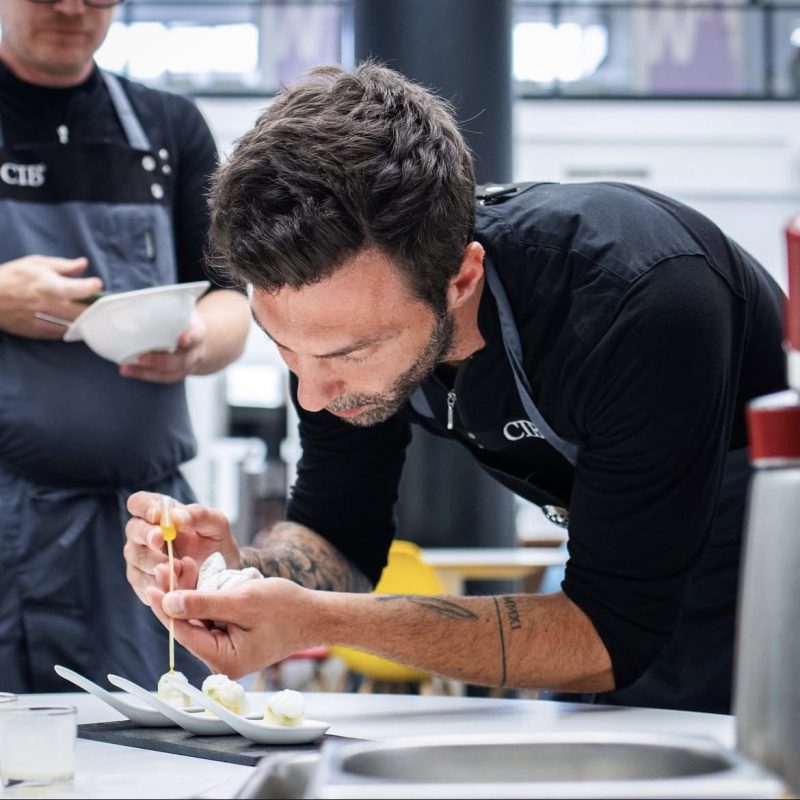
Passion, discipline, and dedication: keys to success as a professional chef
Looking to the future, Sary has a clear goal: to open the first Spanish restaurant in Beirut. It would be a natural evolution of Cena by Sary, a place to share his vision of Spanish gastronomy with a wider audience. He’s convinced that Lebanon is living a period of culinary effervescence and that its dining scene will keep growing, fueled by a culture that celebrates food, drink, and togetherness.
Sary’s journey began humbly, in jobs where he earned little but learned a lot. His curiosity and drive remain as strong as ever. For him, a good chef must always be in motion. Learning, traveling, tasting, reinventing. Though the profession is demanding and full of sacrifices, he insists it’s only sustainable through passion.
I’m passionate about learning and evolving. Cooking is hard work, but it’s vital to enjoy it.
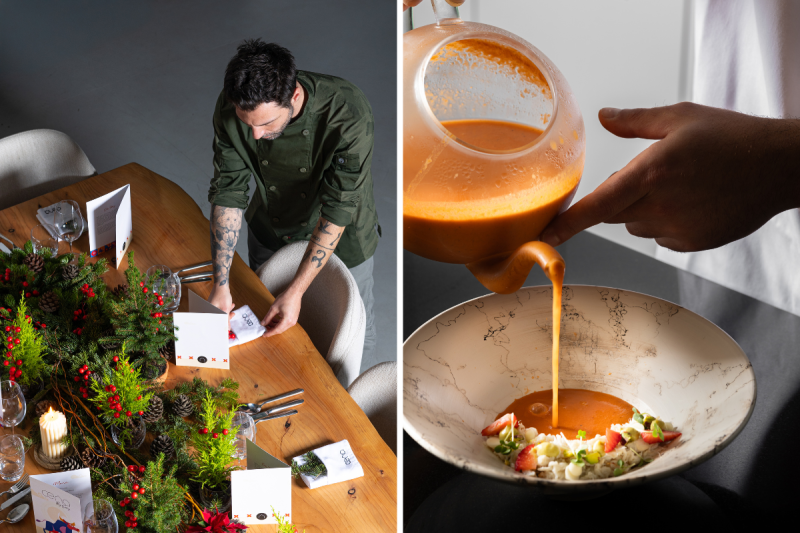
If he were to build his own team, he says he would look for only three qualities: passion, discipline, and dedication; the foundation of a lasting career beyond talent or technique. His advice to aspiring chefs is simple: love what you do and respect nature. If you don’t feel that connection, find another path.
Feeding people is something sacred. You can change their mood and their day, so you have to love what you do. We can have a real impact on people, and that’s a responsibility.
For Sary, cooking is more than a profession. He lights up when he reflects on the ability chefs have to care for others, to move them emotionally, and to leave a positive mark on their lives. His deeply human vision of gastronomy sums up everything he’s learned: true success only comes when you work with devotion and love for what you do.

